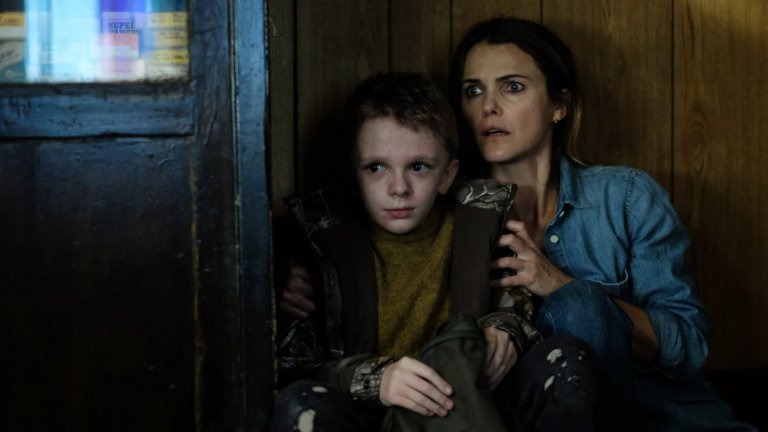Antlers Review: Wendigo Horror Movie Gets Lost In The Woods
Director Scott Cooper and producer Guillermo Del Toro can't save the sometimes atmospheric Antlers from a bad script.

There’s a moment in Antlers when a character we’ve only met briefly, played by a seasoned actor, goes to a house to check on the welfare of a child. The character opens the door and it’s immediately apparent that the inside of the darkened, scary home smells horrible—the stink of death. So does this character, whose job is one of supreme responsibility, retreat immediately and call the police to report that something is very wrong in this place?
Nah. Unlike, say, Teyonah Parris in the much smarter and eerier Candyman—who takes one look down a flight of basement steps and firmly closes the door instead of taking a step down—the character in Antlers probes further into the house, against all reason and sanity. Guess how the scene ends?
That one sequence sums up Antlers in a nutshell. Directed and co-written by Scott Cooper from a short story by Nick Antosca, who also contributed to the script, and produced by Guillermo Del Toro (who should know better), Antlers throws some half-baked First Nations lore and modern social commentary at the viewer to make us think it’s smarter than it really is. But the characters in this COVID-delayed rural horror exercise all act as stupid as those horny teens in slasher movies that used to give the horror genre a bad name, and the film never finds the significance it’s looking for.
Keri Russell stars as Julia, a teacher who returns to the small Oregon town in which she grew up to take a position at the local elementary school, temporarily moving back into her family home with her brother Paul (Jesse Plemons), who’s the local sheriff. Julia and Paul have a dark family history of abuse while the town itself is a compendium of every disaster that could possibly befall a tiny American hamlet like this: the closing of the local mining industry leading to financial collapse, environmental issues, rampant drug use, and extreme poverty are all such a part of the landscape that it’s a wonder the place hasn’t vanished off the map like Frances McDormand’s former home in Nomadland.
Everyone is disappointed, depressed, and angry, which instantly sets Antlers on a course of being 90 minutes or so of misery porn. Everyone, including Julia and Paul, is also solely defined by that, which gives the cast and their characters no room to breathe. When the supernatural horror comes, it’s almost a relief that at least something has changed.
The horror does come in the form of Lucas Weaver (Jeremy T. Thomas), a little boy in Julia’s class who seems like he’s suffering from neglect at home. Julia, a victim of abuse herself, suspects the same for Lucas, whose dad (Scott Haze) and brother (Sawyer Jones) are nowhere to be seen. But there is the Wendigo, a malevolent nature spirit of Native American lore that feeds on humans, which may or may not explain Lucas’ vanishing family.
The Wendigo i an impressive creation in the film. Traditionally embodied as a deer-like creature, the movie’s version of the monster appears to be made of the forest and earth itself, with embers drifting off its branch-like appendages as if fresh out of a fire. We see a lot of it early on but it’s still a well-crafted movie monster. It’s just too bad that it’s never really made clear what the Wendigo—which has served as a useful metaphor in tales like Stephen King’s Pet Sematary and indie filmmaker Larry Fessenden’s Wendigo—is supposed to be doing here. Its background is explained in a long expository dump by the excellent First Nations actor Graham Greene, who’s wasted as the film’s token Native American in a couple of brief scenes, but its connection to the town and its many problems never adds up.
It doesn’t help that our ostensible heroes in Paul and Julia keep bumping up against their own bad choices. The characters in Antlers are the kind who refuse to believe all evidence that something supernatural is afoot, even when it’s right in front of them, and poor Jesse Plemons’ Paul has to be the most passive, brainless law enforcement official we’ve seen in quite some time. All the characters show evidence of having most of their development trimmed away, and the movie itself feels like it’s been cut to the bare essence to fit that hour-and-a-half slot.
Cooper can be a fine director, as he’s shown on movies like Crazy Heart and the bleak yet transcendent Hostiles. He dives without hesitation into gruesome horror imagery and evokes moments of genuine dread. But the film’s clumsy, heavy-handed attempts to weld its messages to its monster action bog it down. The idea of something emerging out of folklore as a response to both the suffering endured by humans and the land is a sound one—and one that has been used in horror before—but the sour Antlers never achieves the clarity, empathy, or sense of awe that required to make it work.
Antlers is out in theaters on Friday, Oct. 29.
